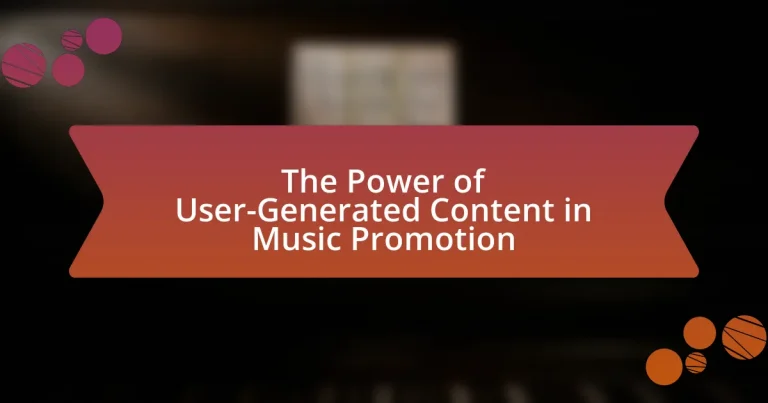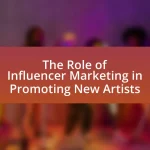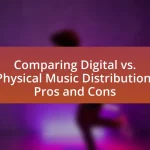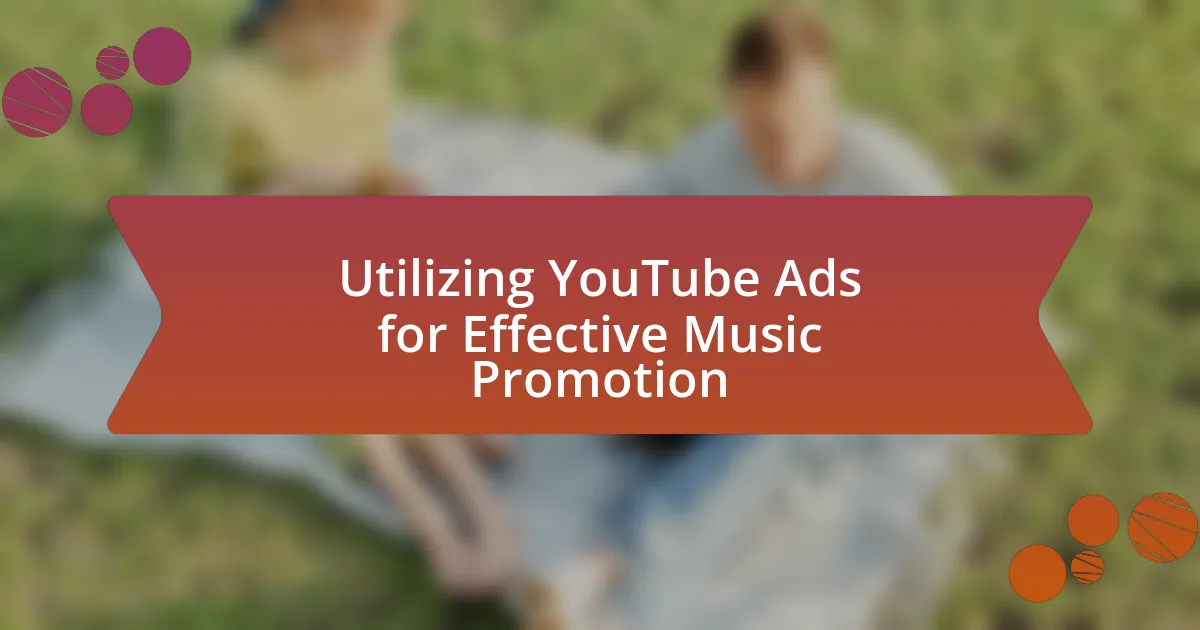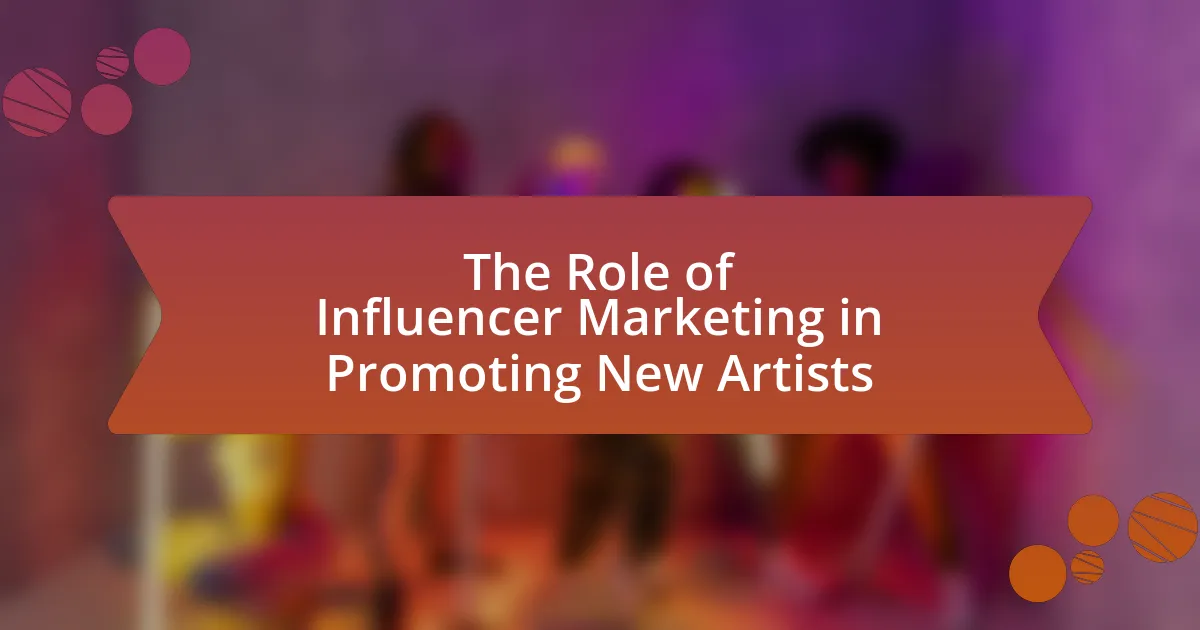User-Generated Content (UGC) plays a crucial role in music promotion by enabling fans to create and share content that enhances an artist’s visibility and engagement. This article explores how UGC influences music marketing strategies, the types of content that are most effective, and the importance of authenticity in building a fan community. It also addresses the benefits of UGC for emerging artists, the metrics for measuring its impact, and the challenges artists face in managing UGC. Additionally, the article provides practical tips for artists to effectively utilize UGC in their promotional efforts, including strategies for encouraging participation and maintaining a consistent brand voice.
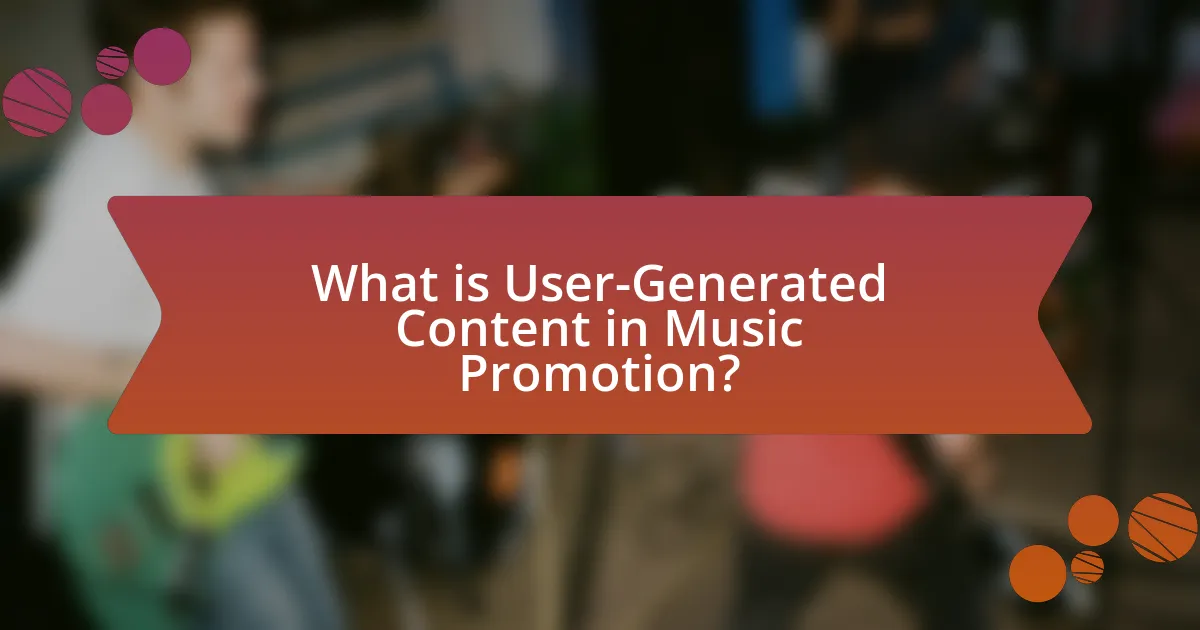
What is User-Generated Content in Music Promotion?
User-Generated Content (UGC) in music promotion refers to any content created by fans or users that promotes an artist, song, or album. This includes social media posts, videos, reviews, and remixes that fans share, which can significantly enhance an artist’s visibility and engagement. According to a study by the Digital Marketing Institute, 79% of people say user-generated content highly impacts their purchasing decisions, demonstrating its effectiveness in reaching wider audiences and fostering community around music.
How does User-Generated Content influence music marketing strategies?
User-Generated Content (UGC) significantly influences music marketing strategies by enhancing audience engagement and authenticity. UGC allows fans to create and share their own content related to an artist or song, which fosters a sense of community and personal connection. For instance, platforms like TikTok have demonstrated that user-created videos can lead to viral trends, directly impacting song popularity and streaming numbers. A study by the Digital Marketing Institute found that 79% of people say user-generated content highly impacts their purchasing decisions, indicating that UGC can drive music sales and concert attendance. This shift towards incorporating UGC in marketing strategies allows artists and labels to leverage organic promotion, ultimately leading to increased visibility and fan loyalty.
What types of User-Generated Content are most effective in music promotion?
The most effective types of User-Generated Content (UGC) in music promotion include fan covers, remixes, and social media challenges. Fan covers allow artists to engage with their audience by showcasing their music through different interpretations, which can lead to increased visibility and reach. Remixes enable fans to creatively reinterpret songs, often resulting in viral trends that amplify the original track’s popularity. Social media challenges, such as dance or lip-sync challenges, encourage user participation and sharing, significantly enhancing audience engagement and promoting the music organically. According to a study by the University of Southern California, UGC can increase brand engagement by up to 28%, demonstrating its effectiveness in music promotion.
How do artists leverage User-Generated Content for audience engagement?
Artists leverage User-Generated Content (UGC) to enhance audience engagement by encouraging fans to create and share content related to their music, which fosters a sense of community and personal connection. This strategy not only amplifies the reach of their promotional efforts but also provides authentic testimonials that resonate with potential listeners. For instance, a study by the Digital Marketing Institute found that 79% of people say user-generated content highly impacts their purchasing decisions, indicating that UGC can significantly influence audience behavior. By utilizing platforms like social media, artists can showcase fan-created videos, artwork, or covers, thereby increasing interaction and loyalty among their audience.
Why is User-Generated Content important for emerging artists?
User-Generated Content (UGC) is important for emerging artists because it enhances visibility and fosters community engagement. UGC allows fans to create and share content related to an artist’s work, which can significantly amplify the artist’s reach. For instance, a study by the Content Marketing Institute found that 79% of people say user-generated content highly impacts their purchasing decisions, indicating that UGC can drive listener engagement and increase sales for emerging artists. Additionally, platforms like Instagram and TikTok have shown that content created by users can lead to viral trends, further promoting the artist’s music and brand.
What role does authenticity play in User-Generated Content?
Authenticity is crucial in User-Generated Content (UGC) as it fosters trust and engagement among audiences. When users perceive content as genuine, they are more likely to connect with it emotionally, leading to increased sharing and interaction. Research indicates that 79% of consumers say user-generated content highly impacts their purchasing decisions, demonstrating that authentic UGC can significantly influence consumer behavior. This connection is particularly vital in music promotion, where fans often seek relatable and real experiences from artists and their communities.
How can User-Generated Content help build a fan community?
User-Generated Content (UGC) helps build a fan community by fostering engagement and creating a sense of belonging among fans. When fans contribute their own content, such as reviews, videos, or artwork, they feel more connected to the music and the artist, which enhances their loyalty. Research indicates that 79% of people say user-generated content highly impacts their purchasing decisions, demonstrating its effectiveness in creating a vibrant community around shared interests. Additionally, UGC encourages interaction among fans, as they share and discuss each other’s contributions, further solidifying community ties.
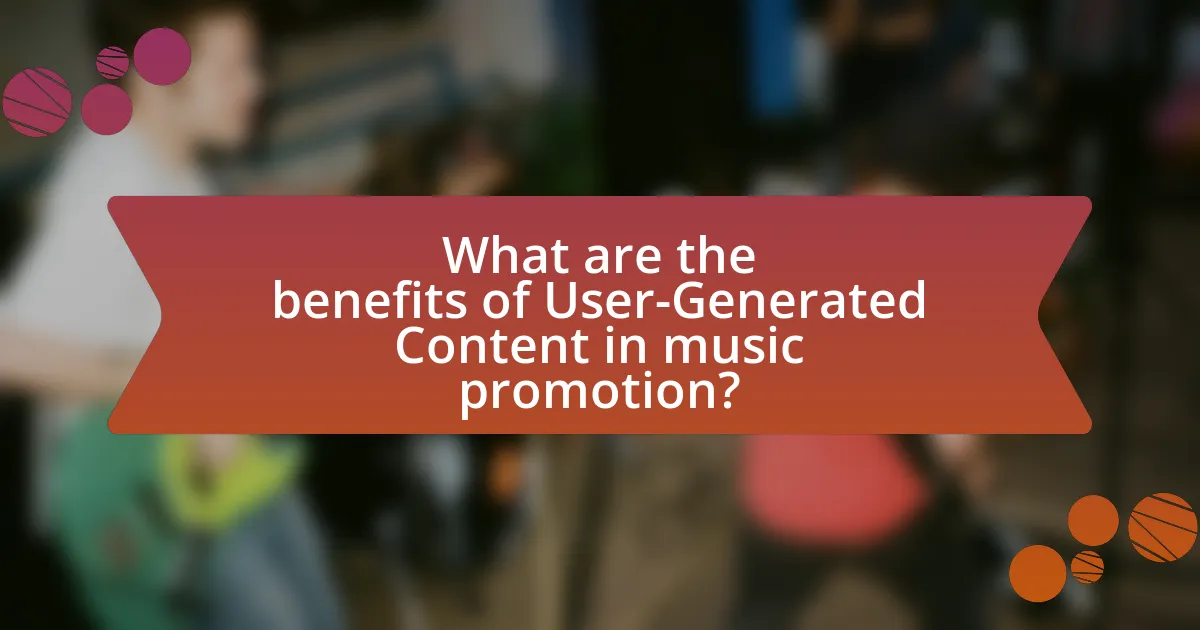
What are the benefits of User-Generated Content in music promotion?
User-Generated Content (UGC) significantly enhances music promotion by fostering authentic engagement and expanding reach. UGC allows fans to create and share their own content related to an artist or song, which can lead to increased visibility and credibility. According to a study by Nielsen, 92% of consumers trust organic, user-generated content more than traditional advertising, indicating that UGC can effectively influence listener behavior and drive music consumption. Additionally, platforms like Instagram and TikTok have shown that UGC can lead to viral trends, further amplifying an artist’s exposure and connecting them with broader audiences.
How does User-Generated Content enhance brand visibility for musicians?
User-Generated Content (UGC) enhances brand visibility for musicians by fostering authentic engagement and expanding reach through shared experiences. When fans create and share content related to a musician, such as videos, photos, or reviews, it generates organic promotion that resonates more with potential listeners than traditional advertising. According to a study by Nielsen, 92% of consumers trust user-generated content more than traditional media, indicating that UGC can significantly influence audience perception and interest. This trust leads to increased visibility as shared content circulates across social media platforms, attracting new fans and reinforcing the musician’s brand identity.
What metrics can be used to measure the impact of User-Generated Content?
Metrics that can be used to measure the impact of User-Generated Content (UGC) include engagement rates, conversion rates, reach, and sentiment analysis. Engagement rates, which encompass likes, shares, comments, and interactions, indicate how well the content resonates with the audience. Conversion rates measure the percentage of users who take a desired action, such as purchasing music or signing up for a newsletter, after interacting with UGC. Reach quantifies the total number of unique users who view the content, providing insight into its visibility. Sentiment analysis evaluates the emotional tone of user comments and feedback, helping to gauge public perception. These metrics collectively provide a comprehensive view of UGC’s effectiveness in music promotion.
How does User-Generated Content contribute to organic reach on social media?
User-Generated Content (UGC) significantly enhances organic reach on social media by fostering authentic engagement and trust among users. When individuals create and share content related to a brand or artist, it generates a sense of community and relatability, which encourages others to interact with that content. According to a study by Nielsen, 92% of consumers trust user-generated content more than traditional advertising, indicating that UGC can lead to higher engagement rates and shares. This increased interaction amplifies the visibility of posts, allowing them to reach a broader audience without the need for paid promotion. Furthermore, platforms like Instagram and TikTok prioritize content that garners engagement, meaning UGC is more likely to be featured in users’ feeds, further enhancing its organic reach.
What challenges do artists face when using User-Generated Content?
Artists face several challenges when using User-Generated Content (UGC), primarily related to copyright issues, quality control, and audience engagement. Copyright challenges arise because artists must navigate the complexities of intellectual property rights, as UGC may include copyrighted material that could lead to legal disputes. Quality control is another significant challenge, as the content created by users may not align with the artist’s brand or artistic vision, potentially diluting their message. Additionally, engaging with UGC requires artists to actively manage and curate submissions, which can be time-consuming and may not always yield the desired level of audience interaction or promotion. These challenges highlight the need for artists to develop clear guidelines and strategies when incorporating UGC into their promotional efforts.
How can artists manage negative User-Generated Content effectively?
Artists can manage negative User-Generated Content effectively by actively monitoring their online presence and engaging with their audience. By utilizing social media management tools, artists can track mentions and comments, allowing them to respond promptly to negative feedback. Engaging directly with critics can demonstrate a willingness to listen and improve, which can mitigate the impact of negative content. Research indicates that 70% of consumers are more likely to support a brand that responds to negative feedback, highlighting the importance of engagement. Additionally, artists can create a positive narrative by encouraging satisfied fans to share their experiences, thereby overshadowing negative comments with positive User-Generated Content.
What legal considerations should artists be aware of regarding User-Generated Content?
Artists should be aware that User-Generated Content (UGC) can raise legal issues related to copyright, licensing, and liability. Copyright law protects original works, meaning that if users create content that incorporates an artist’s music or visuals without permission, it may infringe on the artist’s rights. Additionally, artists must consider licensing agreements that may be necessary to allow the use of their work in UGC, ensuring they retain control over how their content is used. Liability concerns also arise if UGC includes defamatory or infringing material, which could lead to legal repercussions for the artist. Understanding these legal frameworks is essential for artists to navigate the complexities of UGC effectively.
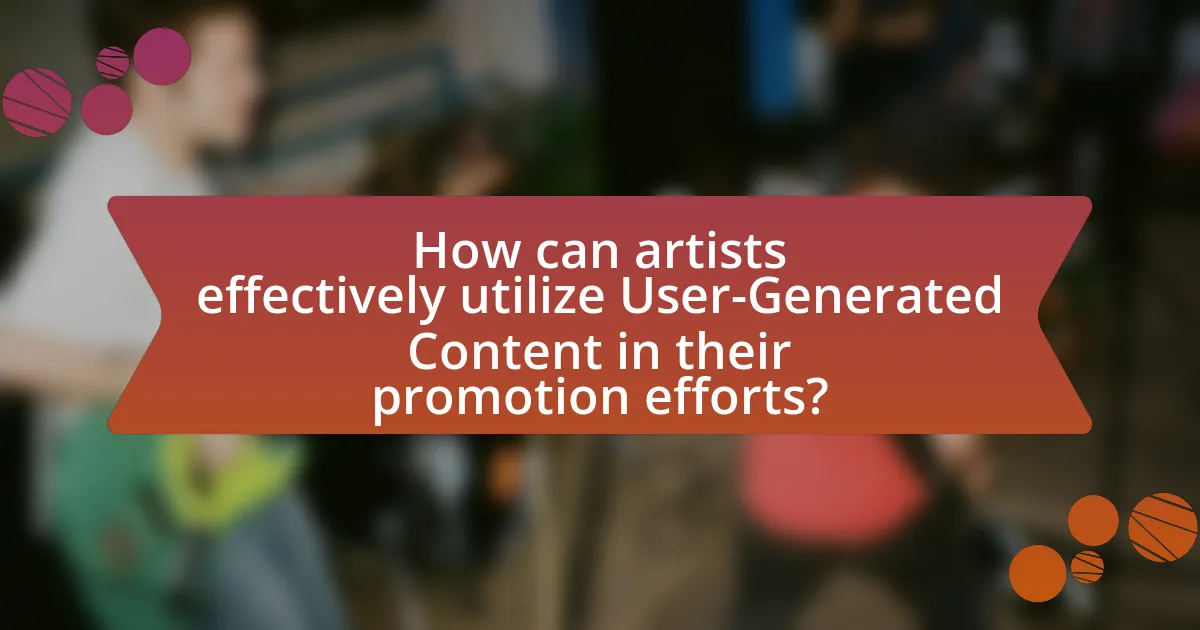
How can artists effectively utilize User-Generated Content in their promotion efforts?
Artists can effectively utilize User-Generated Content (UGC) in their promotion efforts by encouraging fans to create and share content related to their music, such as videos, artwork, or testimonials. This approach not only fosters community engagement but also enhances authenticity, as potential listeners often trust peer-generated content more than traditional advertising. For instance, a study by Nielsen found that 92% of consumers trust recommendations from friends and family over any other form of advertising. By leveraging UGC, artists can amplify their reach, as shared content can go viral, leading to increased visibility and potential new fans. Additionally, featuring UGC on official channels, such as social media or websites, can create a sense of belonging among fans, further solidifying their loyalty and encouraging more content creation.
What strategies can artists implement to encourage User-Generated Content?
Artists can encourage User-Generated Content (UGC) by creating interactive campaigns that invite fans to participate. For instance, artists can host contests where fans submit their own interpretations of a song, share cover versions, or create dance challenges on platforms like TikTok. This strategy not only engages the audience but also fosters a sense of community and ownership among fans.
Research indicates that campaigns leveraging UGC can increase engagement rates significantly; for example, a study by the Content Marketing Institute found that UGC campaigns can lead to a 28% increase in engagement compared to traditional marketing methods. By incentivizing participation through rewards or recognition, artists can further motivate fans to contribute content, thereby amplifying their reach and enhancing their promotional efforts.
How can contests and campaigns drive User-Generated Content creation?
Contests and campaigns can drive User-Generated Content (UGC) creation by incentivizing participants to engage creatively with a brand or product. When organizations launch contests, they often provide clear guidelines and themes that encourage users to produce content, such as videos, photos, or written pieces, related to the campaign. For instance, a music promotion campaign might ask fans to create videos showcasing their dance moves to a new song, thereby generating a wealth of UGC that can be shared across social media platforms.
Research indicates that campaigns with user participation can increase engagement rates significantly; for example, a study by the Content Marketing Institute found that 79% of consumers say user-generated content highly impacts their purchasing decisions. This demonstrates that contests not only stimulate content creation but also enhance brand visibility and consumer trust.
What platforms are best suited for sharing User-Generated Content in music promotion?
The best platforms for sharing User-Generated Content in music promotion are Instagram, TikTok, and YouTube. Instagram allows users to share photos and videos, making it ideal for artists to engage with fans through visual content. TikTok’s short-form video format encourages creativity and virality, enabling users to create music-related challenges that can rapidly increase exposure. YouTube serves as a comprehensive platform for longer videos, allowing artists to showcase user-generated covers, remixes, and fan-made content, which can enhance community engagement and visibility. These platforms collectively leverage user interaction and sharing capabilities, making them effective for music promotion.
What best practices should artists follow when engaging with User-Generated Content?
Artists should prioritize authenticity and engagement when interacting with User-Generated Content (UGC). Authenticity fosters trust and encourages fans to share their genuine experiences, while active engagement, such as responding to comments and sharing fan-created content, strengthens community ties. Research indicates that 79% of consumers say user-generated content highly impacts their purchasing decisions, highlighting the importance of leveraging UGC effectively. By showcasing UGC on their platforms, artists can enhance their visibility and create a more relatable brand image, ultimately driving fan loyalty and promoting their music more effectively.
How can artists maintain a consistent brand voice while using User-Generated Content?
Artists can maintain a consistent brand voice while using User-Generated Content (UGC) by establishing clear guidelines that reflect their brand identity and values. These guidelines should include tone, style, and messaging that align with the artist’s established persona, ensuring that any UGC shared resonates with their overall narrative. For instance, if an artist is known for a playful and upbeat style, they should encourage fans to create content that embodies this spirit, thereby reinforcing the brand voice. Additionally, artists can curate UGC by selecting and sharing content that best represents their brand, which helps to maintain a cohesive image across platforms. This approach is supported by the fact that brands with a consistent voice are 3 to 4 times more likely to experience brand visibility and customer loyalty, as noted in various marketing studies.
What are the key elements of a successful User-Generated Content campaign?
The key elements of a successful User-Generated Content (UGC) campaign include clear objectives, audience engagement, incentivization, and effective promotion. Clear objectives define the purpose of the campaign, such as increasing brand awareness or driving sales. Audience engagement fosters community participation, encouraging users to create and share content related to the brand. Incentivization, such as contests or rewards, motivates users to contribute their content. Effective promotion ensures that the UGC reaches a wider audience through social media, email marketing, or collaborations with influencers. Research indicates that campaigns with these elements can increase engagement rates by up to 28% and drive higher conversion rates, demonstrating their effectiveness in music promotion.
What practical tips can artists apply to maximize the impact of User-Generated Content?
Artists can maximize the impact of User-Generated Content (UGC) by actively engaging with their audience and encouraging participation. By creating specific hashtags for fans to use, artists can streamline the collection of UGC, making it easier to share and promote. Additionally, featuring fan-created content on official channels not only acknowledges the fans but also motivates others to contribute, fostering a sense of community. Research indicates that 79% of consumers say user-generated content highly impacts their purchasing decisions, highlighting the effectiveness of UGC in marketing strategies. Furthermore, artists should consider running contests or challenges that incentivize fans to create and share content, thereby increasing visibility and interaction.
